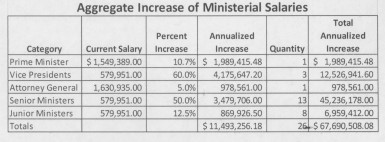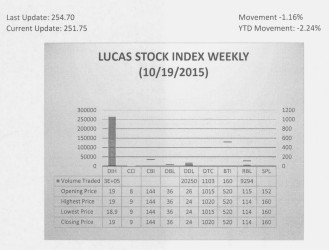Public Outcry
Ever since it was discovered that the new administration had increased the salaries of its ministers and parliamentarians, there has been a public outcry and groundswell of criticism for taking the action. Several contrasting perspectives have been expressed about the move. Some persons seem to believe that the administration was insensitive since it appeared to have offered the public servants increases that did not match those it gave itself. Some support the increase in the salaries, but felt that the timing was bad. Still  others felt that the administration appeared to be in a rush to feather its own nest while leaving the rest of the public service behind. Further still, others wondered what the real issue was because there appeared to be rational reasons for increasing the salaries of the Ministers the way in which it was done. This article seeks to examine the financial impact of the salary increase from a different perspective in an effort to understand the anger that has consumed so many that supported the coalition’s campaign to electoral victory.
others felt that the administration appeared to be in a rush to feather its own nest while leaving the rest of the public service behind. Further still, others wondered what the real issue was because there appeared to be rational reasons for increasing the salaries of the Ministers the way in which it was done. This article seeks to examine the financial impact of the salary increase from a different perspective in an effort to understand the anger that has consumed so many that supported the coalition’s campaign to electoral victory.
Aggregate increase
Lacking in skills of psychoanalysis, this effort will not seek to interpret the mind set of fuming and vexatious Guyanese. Instead, an effort will be made here to present the economic impact of the decision. To start, it would be useful to understand what the aggregate increase of the salaries for the eight junior ministers, the 13 senior ministers and the four vice-presidents, including the Prime Minister was.

The Table above indicates that the total salary increase is G$67 million. This means that every year an additional G$67 million will be added to the existing salary of ministers unless there was another increase. Therefore, it must have surprised many who might have checked the numbers to discover that the increase in salaries was that small comparatively speaking. The anger that such a small increase appeared to have caused must be related to some other issue than the salary increase itself. It is unimaginable that Guyanese would get off on their recently elected officials for asking to create a realistic salary scale. In the view of this writer, some amount of calm is needed to evaluate rationally the decision of the government to increase the salary of its ministers by varying percentages.
Percentage difference
Apart from realizing how small the absolute increase was, the next step would be to compare the average rate of increase for the ministers as against that for the public servants. It is possible to hold the view that many would discover that the percentage difference in income for the public servants might not be significantly lower than that for the ministers as is being touted publicly. Using a weighted average, which is the correct thing to do since a varied number of ministers benefited from varying interest rates, the average increase in salaries for the 26 ministers was 36 percent.
The data for public servants is not as organized as that of the ministers. However, data from the 2013 and 2015 budgets were used to determine the weights that could be applied to the varying percent increases for public servants mentioned in the 2015 budget. In addition, data on public sector employment published by the Bureau of Statistics was also used to arrive at weights to be applied to the increases mentioned in the 2015 budget. As a consequence, it is estimated that the weighted average increase for public sector workers was 23 percent. The range of 5 to 50 percent that is being bandied about can easily lead to false conclusions about the percentage increase gained by the public servants as against that of the ministers. This is one area that might be fuelling the outrage of the people and it would be helpful if the government undertook a proper comparison of the effect of the salary increases for the benefit of Guyanese.
Focus of Government

The Lucas Stock Index (LSI) declined 1.16 percent during the third trading period of October 2015. The stocks of five companies were traded with 296,103 shares changing hands. There was one Climber and two Tumblers. The stocks of Demerara Tobacco Company (DTC) rose 0.49 percent on the sale of 1,103 shares. The stocks of Demerara Distillers Limited (DDL) fell 7.69 percent on the sale of 20,250 shares while the stocks of Republic Bank Limited (RBL) fell 0.87 percent on the sale of 9,294 shares. In the meanwhile, the stocks of Banks DIH (DIH) and Guyana Bank for Trade and Industry remained unchanged on the sale of 265,296 and 160 shares respectively.
This writer believes that the focus of the government should be on the economy and the infrastructure to enable it to achieve its economic goals. Stimulus spending is vital to the revival of the Guyana economy. This was likely to occur faster if a larger proportion of the economy got a large increase. The salary increase of the ministers however was not connected to the goal of stimulating the economy. It was connected to setting a realistic salary scale for ministers who carry different portfolios and levels of responsibility. The increase given to the ministers while useful would not have a significant impact on the economy. This is good because it means that there would be less risk of inflation. In addition, the increase in ministerial salaries represents an insignificant reallocation of national resources. When measured against gross domestic product (GDP), the increase is less than half of half of 1 percent of GDP, a mere drop in the bucket. A similar effect is observed on the money supply. The increase is therefore neither threatening nor disruptive of the Guyana economy.
Amidst the protestations, many Guyanese have expressed second thoughts about voting for the current administration and are uncertain as to if they did the right thing. That is natural when unexplained or inadequately explained actions make the future look very uncertain. One has got to look for something reasonable or rational to live with a decision that on the surface appears to be unreasonable. In effect, what some Guyanese appear to be doing is using the G$67 million salary increase to assess the opportunity cost of the election decision made on May 11 this year.
Amazing
It is possible to take any number of scenarios to compare the salary increase to determine its economic significance and whether or not the genuine public outrage was justified. When one thinks of what sugar production and exports mean to the taxpayers of Guyana, it is enough to make one shudder. The reality facing the country for several years of the PPP/C reign was a world price that was below the cost at which Guyana could produce sugar. Various sources put the cost of sugar production in Guyana between 36 to 45 US cents while export prices have been put at 12 US cents. What this means is that for every pound of sugar exported, Guyanese taxpayers subsidize the foreign consumer by 24 to 32 US cents. For every 100,000 tonnes of sugar exported, Guyanese taxpayers give away the equivalent of G$12 billion each year the price is as calculated. That money that taxpayers give up without a fuss in one year translates into money that could be used to pay the ministerial increase of G$67 billion for 131 years. It is amazing that Guyanese cannot contextualize the drastic impact that GuySuCo has on them yearly, but are ready to crucify the 27 men and women who have decided to pay themselves less than half of half of one percent of a singular year’s financial loss while making positive efforts to stop the bleeding of GuySuCo.
Opportunity cost of failures
Guyanese must not be shy to examine the opportunity cost of failures. The 27 men and women are also making positive strides to give the country a clean landscape and appearance and to minimize the constant flooding that households and businesses experienced under the PPP/C government. Households and businesses suffered personal losses constantly, yet there was no noticeable outrage at those who were in charge. Guyanese should not ignore too the US$32 million fibre optic investment for which they have nothing of consequence to show. One must ask what is different about a salary increase of G$67 million that triggers an outrage on the one hand and wasted expenditure of G$7 billion that is over 100 times worse than the small salary increase on the other?
Only last week the PPP/C was trying to camouflage as beneficial a deal that would have resulted in a G$4.6 billion loss to Guyanese taxpayers had it been allowed to sell the Marriott Hotel. Guyanese would have been denied today not 10, 15 or 50 years from now, but today 68 times the amount of money paid to the ministers. Alternatively, it would take the ministers 68 years of undiscounted increase to lose what the people of this country were willing to give away in one day under the PPP/C government.
The fuss
The present administration could be criticized for mishandling a simple task of salary increase, but the fuss over the G$67 million bothers this writer. It appears as if Guyanese seem concerned over small mercies and not the bounty that this country has lost or was at risk of losing further under a re-elected PPP/C government. Guyanese seem comfortable to strain their eyes to search for the speck in the eyes of the present administration, but uncomfortable to stare at the beam lodged in the eyes of the former regime. This contradiction it would appear derives from a failure to internalize the consequences of the many reckless decisions of the PPP/C. They have reserved their new found freedom for the new administration.



